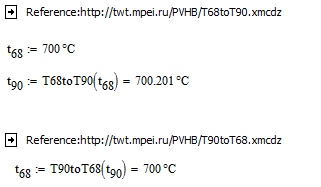Community Tip - Stay updated on what is happening on the PTC Community by subscribing to PTC Community Announcements. X
- Subscribe to RSS Feed
- Mark Topic as New
- Mark Topic as Read
- Float this Topic for Current User
- Bookmark
- Subscribe
- Mute
- Printer Friendly Page
Trouble with temperature
- Mark as New
- Bookmark
- Subscribe
- Mute
- Subscribe to RSS Feed
- Permalink
- Notify Moderator
Trouble with temperature
I've always had issues with temperature units, early Mathcad had "R" and "K," for Rankine and Kelvin; these made sense, they were confusing but it was the confusion we had been dealing with since we learned about "hot" and "cold."
Then we were given the Centigrade and Fahrenheit scales, and if that didn't suffice, the "difference in temperature" scales.
I began the attached sheet to calculate the change in size as a function of temperature change. I got my answer, but I also got an aggravating question.
Can anyone explain the attached (version 15) sheet; how can -321 °F not be -321 °F?
Solved! Go to Solution.
Accepted Solutions
- Mark as New
- Bookmark
- Subscribe
- Mute
- Subscribe to RSS Feed
- Permalink
- Notify Moderator
Because there's a difference between:

If you know that °F is a function and -321 is (or, appears to be) the parameter it is applied to.
You cannot see it, not even in the mathcad sheet itself, but in fact the first expression is °F applied to -321, while the second expression is the negative of °F applied to 321. To make it explicit:

Success!
Luc
Here's one of the causes for trouble with temperature units:
If today the out-door temperature is 32 °F, and tomorrow it will be twice as cold, then what will the out-door temperature tomorrow be?
- Mark as New
- Bookmark
- Subscribe
- Mute
- Subscribe to RSS Feed
- Permalink
- Notify Moderator
Because there's a difference between:

If you know that °F is a function and -321 is (or, appears to be) the parameter it is applied to.
You cannot see it, not even in the mathcad sheet itself, but in fact the first expression is °F applied to -321, while the second expression is the negative of °F applied to 321. To make it explicit:

Success!
Luc
Here's one of the causes for trouble with temperature units:
If today the out-door temperature is 32 °F, and tomorrow it will be twice as cold, then what will the out-door temperature tomorrow be?
- Mark as New
- Bookmark
- Subscribe
- Mute
- Subscribe to RSS Feed
- Permalink
- Notify Moderator
Is a physicist asking, or an engineer?
- Mark as New
- Bookmark
- Subscribe
- Mute
- Subscribe to RSS Feed
- Permalink
- Notify Moderator
This is one question of a list of questions to ask your teacher in school.
- Mark as New
- Bookmark
- Subscribe
- Mute
- Subscribe to RSS Feed
- Permalink
- Notify Moderator
Only if you want your teacher to dislike you because they think you are a smartass ![]()
- Mark as New
- Bookmark
- Subscribe
- Mute
- Subscribe to RSS Feed
- Permalink
- Notify Moderator
I tried to be a physicist but they wouldn't let me in. Engineers are either failed physicists or physicists that couldn't find employment.
- Mark as New
- Bookmark
- Subscribe
- Mute
- Subscribe to RSS Feed
- Permalink
- Notify Moderator
I thought physicists are either failed mathematicians or mathematicians that couldn't find employment.
- Mark as New
- Bookmark
- Subscribe
- Mute
- Subscribe to RSS Feed
- Permalink
- Notify Moderator
Richard Jackson wrote:
I thought physicists are either failed mathematicians or mathematicians that couldn't find employment.
No. We're the ones with multibillion dollar budgets and cute toys capable of destroying all life on the planet (if not the planet itself). Here's one we made earlier after a mathematician made a similar remark:

We very sporting about it and gave him a fighting chance. We kindly let him light the blue touch paper on the five minute fuse and start running. Of course, we had a remote for the detonator just in case ... ![]()
Stuart
- Mark as New
- Bookmark
- Subscribe
- Mute
- Subscribe to RSS Feed
- Permalink
- Notify Moderator
- Mark as New
- Bookmark
- Subscribe
- Mute
- Subscribe to RSS Feed
- Permalink
- Notify Moderator
You're right Valery.
In Prime 3.1 (and I guess/hope the same is/will be true for earlier and newer versions of prime) you cannot apply the minus sign to the entire expression without ending up with brackets:

And if you remove a bracket in the second expression, (the other bracket also automatically disappears as it should and) the minus sign gets applied to the number alone, so you end up with a copy of the first expression and (therefore) the result changes to 77.039 K.
- Mark as New
- Bookmark
- Subscribe
- Mute
- Subscribe to RSS Feed
- Permalink
- Notify Moderator
Two useful cloud functions for the working with temperature:

And the second.
Maple has 6 temperature scales, but Mathcad only 4. why?





